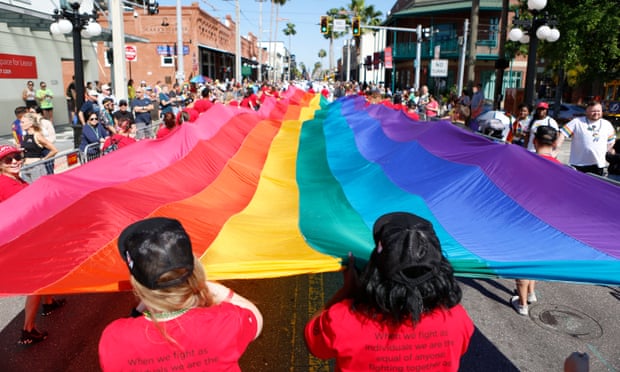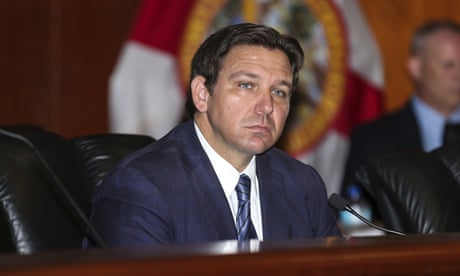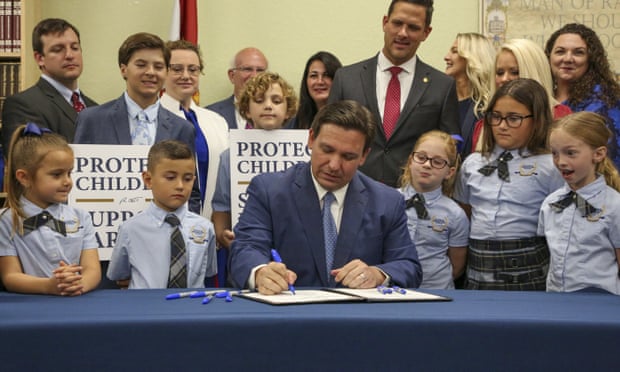Lack of guidance by state’s education department and possible implications has teachers worried as school year begins

The Tampa Pride 2022 was held in the wake of the passage of Florida's controversial "don't say gay" bill. Photograph: Octavio Jones/Getty Images
Michael Sainato
Michael Sainato
Wed 31 Aug 2022
Michael Woods, a high school special education teacher in Palm Beach county, Florida, with 30 years of experience teaching and who grew up as a student in the area who was bullied for being gay, said he cried the night before this school year began in August 2022 because of anxiety related to Florida’s “don’t say gay” bill that went into effect in July 2022.

Florida governor Ron DeSantis attacks media in ‘Top Gun’ campaign ad
“As a gay teacher, as a queer male, it’s been painful for me, it’s been very painful and very upsetting,” said Woods. “It’s had a chilling effect, because I’m really questioning myself, about what conversations I can have and there’s really no clarity on it.”
Before the school year began, Woods’ district issued guidance over reviewing all books in classrooms for anything that could be perceived as controversial in regards to the new legislation, which prompted him to remove a library that he’s maintained in his classroom for over 20 years because of how arduous a task it would be to review every single book.
Woods has had several longtime teachers email him with questions about the law, as the Florida department of education still hasn’t issued guidance on the legislation for teachers from fourth to 12th grade. Teachers are also worried about the implications of what violating the law could be, from facing lawsuits to termination.
“I went to school in this district and I thought we had resolved all these issues, and created safe spaces, because I remember being bullied. And I feel almost like as an adult, I’m being re-bullied by these laws,” added Woods. “If you’re going to write legislation, it should be a requirement that it positively impacts the classroom, that it positively impacts teaching, that it positively gives strategies that will make kids successful, and not make it and their adult teachers feel like they are less than or they don’t matter. Because I do matter. My kids matter.”
I think the biggest thing going into the school year is this bill ... gives parents the ability to bring complaints against teachers, bring lawsuits against school districts ...Andrew Spar
The bill, called the parental educational rights bill by its Republican authors, prohibits classroom instruction on sexual orientation or gender identity in kindergarten through third grade, but also vaguely prohibits instruction deemed age inappropriate in the public school system. The bill also grants parents the right to file lawsuits for damages if a school district doesn’t resolve a complaint about their child’s education.
That vagueness and the rhetoric of the bill’s proponents have incited fears and anxiety that the legislation will be used to suppress and intimidate acknowledgement of the LGBTQ+ community in schools and embolden hate toward the LGBTQ+ community.
“These bills are all based on false pretenses, their lies, they’re based on lies, they make assumptions that something is happening in our schools area, that teachers are somehow indoctrinating our students, teaching them to be gay, or whatever the case may be,” said Andrew Spar, president of the Florida Education Association.
Spar added: “I think the biggest thing going into the school year is the unknown, because this bill and these other bills that are out there, give parents the ability to bring complaints against teachers, bring lawsuits against school districts, and we just don’t know how it’s going to play out.”
Several lawsuits have been filed challenging the bill as LGBTQ+ groups have strongly opposed the legislation.
The White House criticized the bill and characterized it as “discrimination, plain and simple. It’s part of a disturbing and dangerous nationwide trend of rightwing politicians cynically targeting LGBTQI+ students, educators, and individuals to score political points.”
Michael Woods, a high school special education teacher in Palm Beach county, Florida, with 30 years of experience teaching and who grew up as a student in the area who was bullied for being gay, said he cried the night before this school year began in August 2022 because of anxiety related to Florida’s “don’t say gay” bill that went into effect in July 2022.

Florida governor Ron DeSantis attacks media in ‘Top Gun’ campaign ad
“As a gay teacher, as a queer male, it’s been painful for me, it’s been very painful and very upsetting,” said Woods. “It’s had a chilling effect, because I’m really questioning myself, about what conversations I can have and there’s really no clarity on it.”
Before the school year began, Woods’ district issued guidance over reviewing all books in classrooms for anything that could be perceived as controversial in regards to the new legislation, which prompted him to remove a library that he’s maintained in his classroom for over 20 years because of how arduous a task it would be to review every single book.
Woods has had several longtime teachers email him with questions about the law, as the Florida department of education still hasn’t issued guidance on the legislation for teachers from fourth to 12th grade. Teachers are also worried about the implications of what violating the law could be, from facing lawsuits to termination.
“I went to school in this district and I thought we had resolved all these issues, and created safe spaces, because I remember being bullied. And I feel almost like as an adult, I’m being re-bullied by these laws,” added Woods. “If you’re going to write legislation, it should be a requirement that it positively impacts the classroom, that it positively impacts teaching, that it positively gives strategies that will make kids successful, and not make it and their adult teachers feel like they are less than or they don’t matter. Because I do matter. My kids matter.”
I think the biggest thing going into the school year is this bill ... gives parents the ability to bring complaints against teachers, bring lawsuits against school districts ...Andrew Spar
The bill, called the parental educational rights bill by its Republican authors, prohibits classroom instruction on sexual orientation or gender identity in kindergarten through third grade, but also vaguely prohibits instruction deemed age inappropriate in the public school system. The bill also grants parents the right to file lawsuits for damages if a school district doesn’t resolve a complaint about their child’s education.
That vagueness and the rhetoric of the bill’s proponents have incited fears and anxiety that the legislation will be used to suppress and intimidate acknowledgement of the LGBTQ+ community in schools and embolden hate toward the LGBTQ+ community.
“These bills are all based on false pretenses, their lies, they’re based on lies, they make assumptions that something is happening in our schools area, that teachers are somehow indoctrinating our students, teaching them to be gay, or whatever the case may be,” said Andrew Spar, president of the Florida Education Association.
Spar added: “I think the biggest thing going into the school year is the unknown, because this bill and these other bills that are out there, give parents the ability to bring complaints against teachers, bring lawsuits against school districts, and we just don’t know how it’s going to play out.”
Several lawsuits have been filed challenging the bill as LGBTQ+ groups have strongly opposed the legislation.
The White House criticized the bill and characterized it as “discrimination, plain and simple. It’s part of a disturbing and dangerous nationwide trend of rightwing politicians cynically targeting LGBTQI+ students, educators, and individuals to score political points.”

Ron DeSantis, the governor of Florida, signing the ‘don’t say gay’ bill in March 2022. Photograph: Douglas R Clifford/AP
The bill has gone into effect as Florida is currently facing a shortage of more than 9,000 teacher and staff vacancies across the state.
Clinton McCracken, the president of the Orange County Classroom Teachers Association in Orlando, Florida, explained he and the district have been working on trying to develop and issue guidance over questions and concerns teachers and students have on how the legislation impacts them, and trying to reaffirm support.
Despite this, McCracken noted there are still concerns over issues such as when to report to parents that their child is having sexual identity issues and fears over parents and far-right groups intent on targeting teachers and the ongoing rhetoric from Florida Republican leaders that vilifies teachers.
“Because the law was written in such a vague way, there are a lot of teachers who are self censoring,” said McCracken.
He argued rather than have to worry about politically motivated culture war attacks on teachers and public education, that teachers would like to see issues such as staffing shortages, low pay, and inadequate funding of public education be addressed.
Florida ranks 48th in the US in overall teacher salaries. According to EducationData.org, Florida ranks 42nd in the US for public education spending and single pupil spending falls thousands of dollars below the national average.
“All of these real huge concerns in public education is what we should be talking about in the news and the governor should be talking about,” added McCracken. “It should be considered a crisis in education but he has everyone talking about these false flag narratives. It’s all very frustrating because we do have massive problems in public education and this isn’t one of them.”
The bill has gone into effect as Florida is currently facing a shortage of more than 9,000 teacher and staff vacancies across the state.
Clinton McCracken, the president of the Orange County Classroom Teachers Association in Orlando, Florida, explained he and the district have been working on trying to develop and issue guidance over questions and concerns teachers and students have on how the legislation impacts them, and trying to reaffirm support.
Despite this, McCracken noted there are still concerns over issues such as when to report to parents that their child is having sexual identity issues and fears over parents and far-right groups intent on targeting teachers and the ongoing rhetoric from Florida Republican leaders that vilifies teachers.
“Because the law was written in such a vague way, there are a lot of teachers who are self censoring,” said McCracken.
He argued rather than have to worry about politically motivated culture war attacks on teachers and public education, that teachers would like to see issues such as staffing shortages, low pay, and inadequate funding of public education be addressed.
Florida ranks 48th in the US in overall teacher salaries. According to EducationData.org, Florida ranks 42nd in the US for public education spending and single pupil spending falls thousands of dollars below the national average.
“All of these real huge concerns in public education is what we should be talking about in the news and the governor should be talking about,” added McCracken. “It should be considered a crisis in education but he has everyone talking about these false flag narratives. It’s all very frustrating because we do have massive problems in public education and this isn’t one of them.”
No comments:
Post a Comment